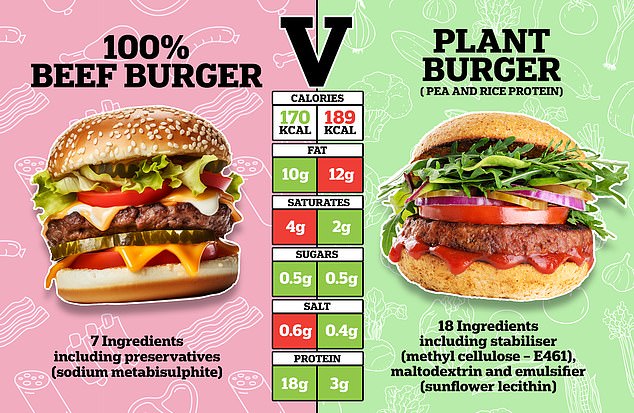Published: | Updated:
Demand for plant-based meat alternatives, gluten-free snacks and other ‘healthy’ options has undeniably taken the world by storm.
Fuelled by a deluge of alarming reports into the dangers of eating too much processed meat, gluten and refined carbohydrates, supermarket shelves are now packed with ‘plant based meat’ and grain and nut-packed granolas.
But, Tracy Campoli, a certified holistic health coach, warned these so-called “healthy” products could be ageing the body from the inside out, causing chronic inflammation and visible signs of ageing.
According to Ms Campoli, some of the most popular plant-based meat-alternatives are seriously lacking in vital nutrients like protein, and are instead packed full of additives, seed oils and salt.
In a video posted to YouTube, the fitness coach analysed five different “healthy foods” that are by their very nature highly processed, and concluded that fake meat is one of the worst offenders when it comes to health.
‘Just because it’s plant-based, it doesn’t mean it’s healthy—you’ve got to read your labels,’ she warned her 347,000 subscribers.
Around 12 per cent of people in the UK eat a meat-free diet, with many choosing to give up red meat in particular because of its supposed link with heart disease and even cancer.
But, Ms Campoli warned: ‘Some of these so-called “good for you” choices may secretly be sabotaging your skin and even speeding up visible signs of ageing like wrinkles.

‘You might think: “I’m going to avoid red meat because of heart disease, sodium and it’s better for the planet.”
‘But more plant-based alternatives might actually be causing some fine wrinkles on your face.
Ms Campoli continued: ‘So many of those mass-marketed plant-based meat alternatives—such as Beyond Meat and Impossible Burger—all use inflammatory oils which can speed up your cellular ageing.’
Seed oils such a canola oil, sunflower and rapeseed oils are high in polyunsaturated fats which, it has long been claimed, are a ‘heart healthy’ substitute for traditional animal fats.
But in recent years, they’ve also found themselves at the centre of a raging health debate.
Detractors refer to seed oils as ‘The Hateful Eight’ – which also include corn, soybean, cottonseed, grapeseed, safflower and rice bran oil.
Critics say these oils—which today make up more than 25 per cent of the calories in our diets—are causing obesity and leading to a host of health problems from type 2 diabetes to depression and even migraines.
It’s a claim that goes against medical advice of the past few decades: butter, dripping and lard are high in ‘bad’ saturated fats which raise cholesterol and heart disease risk, while seed oils contain unsaturated fats that can decrease cholesterol levels and protect the heart.
But according to Ms Campoli seed oils aren’t always the healthier option.
‘They may sound healthy, but they are actually really not great for our body, causing more oxidative stress,’ she warned in the clip.
The main concern us that they are high in omega-6 fatty acids, she explained.
‘When we have an excess of omega-6 in our body it creates more oxidative stress, damages your skin cells and it can cause wrinkles.’
She added that these alternative products are often packed with higher levels of salt than their animal-derived counterparts, as manufacturers try to mimic the taste and texture of real meat.
This, she says, can cause people to bloat and make the skin look more puffy.
Eating too much salt can also lead to high blood pressure, increasing the risk of heart attack and stroke.
‘It’s also not good for your skin because sodium can also lead to dehydration,’ Ms Campoli added.

‘But it’s hydration from the inside out gives us that glowy more youthful-looking skin.
‘If you’re eating a lot of excess salt, you’re going to look dry and dehydrated.
She concluded: ‘All of these ingredients together can cause inflammation in the body.
‘Inflammation is the root cause of so many diseases and health problems so we want to do our best to keep inflammation at bay.
‘You’re better off eating more whole foods than looking for substitutes.’
Wholegrain breads that are full of hidden sugars and emulsifiers, granola, rice cakes and gluten-free snack products also made her blacklist.
‘Many of these products breads contain hidden sugars which contribute to glycation—meaning it stiffens and weakens your collagen, making your skin saggy and contributing to the visible signs of ageing.’
It comes as new research suggests consuming a diet low in ultra-processed foods could help supercharge weight loss.
Additive-laden foods have been vilified for decades over their supposed health risks, with dozens of studies linking them to type 2 diabetes, heart disease and even cancer.
Now, British scientists who tracked dozens of adults have discovered those who ate a diet rich in minimally processed foods and avoided UPFs, lost twice as much weight as those who often consumed UPFs.
Sticking to meals cooked from scratch could also help curb food cravings, they also found.
However, diets high in UPFs had little impact on blood pressure, heart rate, liver function and cholesterol.
Researchers argued their findings echoed calls to limit certain types of UPFs but cautioned it also showed that not all UPFs are ‘inherently unhealthy’.








